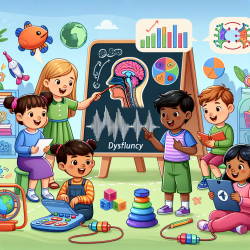Exploring the Cognitive Contributions to ADHD and Academic Achievement
As practitioners working with children, understanding the underlying factors that influence academic achievement is crucial, especially when addressing symptoms of Attention-Deficit/Hyperactivity Disorder (ADHD). A recent study titled "The Contributions of Cognitive Abilities to the Relationship between ADHD Symptoms and Academic Achievement" provides valuable insights into how cognitive abilities impact the academic performance of children exhibiting ADHD symptoms.
Key Findings from the Study
The study analyzed data from 354 elementary school-aged children who were experiencing academic difficulties and behavioral symptoms of inattention (INA) and/or hyperactivity/impulsivity (H/I). The main objective was to determine whether increased levels of these symptoms were associated with lower scores on standardized tests of reading, spelling, and math, after accounting for cognitive processes and background risk factors.
Interestingly, while higher INA scores were initially linked to lower academic performance, these associations did not persist when cognitive variables were considered. This suggests that cognitive abilities, such as working memory, processing speed, and visuospatial skills, play a significant role in academic achievement. In contrast, H/I symptoms were specifically associated with math achievement, highlighting the nuanced impact of different ADHD symptoms on various academic domains.
Implications for Practitioners
For practitioners, these findings underscore the importance of looking beyond observable behavioral symptoms to understand the cognitive factors influencing academic performance. Here are some actionable steps practitioners can take:
- Comprehensive Assessments: Incorporate psycho-educational batteries that evaluate cognitive abilities alongside behavioral assessments to gain a holistic understanding of a child's academic challenges.
- Targeted Interventions: Develop interventions that address specific cognitive deficits, such as working memory or processing speed, to improve academic outcomes.
- Symptom-Level Analysis: Focus on understanding INA and H/I behaviors at the symptom level rather than solely relying on ADHD diagnoses, as these behaviors can manifest in other conditions.
Encouraging Further Research
While this study provides significant insights, it also opens avenues for further research. Future studies could explore the role of additional cognitive variables, such as phonological processing skills, and include non-referred children to enhance the generalizability of findings. Moreover, examining these associations in older children could provide a more comprehensive understanding of how cognitive abilities and ADHD symptoms interact over time.
Conclusion
Understanding the cognitive contributions to the relationship between ADHD symptoms and academic achievement is essential for developing effective interventions. By focusing on cognitive abilities and conducting comprehensive assessments, practitioners can better support children in overcoming academic challenges associated with ADHD symptoms.
To read the original research paper, please follow this link: The Contributions of Cognitive Abilities to the Relationship between ADHD Symptoms and Academic Achievement.










